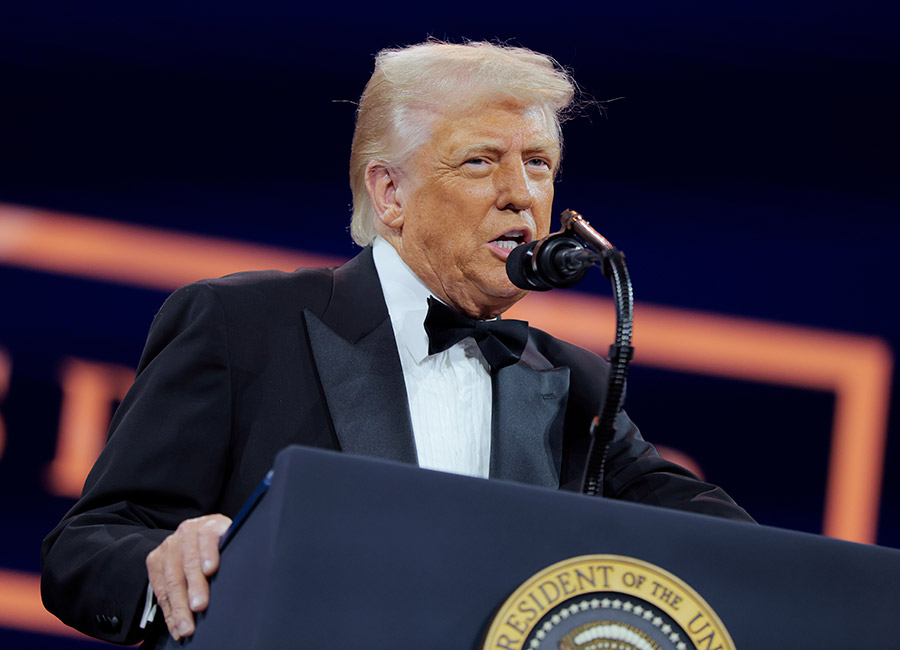Taoiseach Micheál Martin has said "harmful and destructive" tariffs introduced on European goods by the White House could affect around €380bn in US-EU trade.
Speaking on Wednesday, the Taoiseach said the government had been actively preparing but hoping to avoid the 20% blanket tariff on EU goods announced by US President Donald Trump last week.
The tariffs came into effect today (9 April), and are in addition to the 25% tariff imposed on imports of automotive vehicles and steel, aluminium and derivative products.
EU member states this afternoon approved tariffs of around 25% on US goods such as motorcycles, poultry, fruit, wood, and clothing to dental floss, affecting around €22bn of US-EU trade. The tariffs will take effect on a staggered basis, first on 15 April and then on 15 May.
In the Dáil, Martin said that "Ireland has supported and benefitted from a world order in which trade has become more open and globalised. We now need to adjust to a different situation, one in which some are consciously stepping back from that.
"The new policy approach in the United States is one in which the protection of national markets and the raising of protective barriers plays a central part.
"Ireland rightly advocates for an ambitious world trade agenda. We believe trade not only brings economic benefits, it helps lift people and countries out of poverty and it contributes to a more stable and predictable world.
"Retreating behind defensive barriers may appear attractive on the face of it, but it is not a ‘win-lose’ proposition. Ultimately, everyone loses, and the poorest lose most of all."
The Taoiseach went on to describe the tariffs announced by Trump last Wednesday as "deeply concerning and regrettable", citing the "immediate and negative impact" they have had on global financial markets and "grave" medium to long-term consequences.
"While major tariff announcements were trailed in advance, and the Government has been actively preparing, we hoped that this harmful and destructive step could have been avoided," he continued.
"These new tariffs are in addition to the decisions last month by the US to impose tariffs on steel, aluminium and derivative products, as well as on the automotive sector.
"Together, the US tariffs on steel and aluminium, on cars and the blanket 20% tariff on goods from the EU affect around €380 billion of trade between the US and the EU.
"There is no way to sugar-coat it, a 20% per cent blanket tariff on most goods could potentially have a significant effect on Irish investment and the wider economy.
"It represents a huge challenge to Irish exporters to the US across all sectors. We are already hearing from some who are seeing their orders from the US slowing or even drying up entirely, putting valuable and skilled jobs at risk."
Trump last night flagged tariffs on pharmaceuticals, of which Ireland exports €44.4bn to the US annually.
"I hope the US will reflect carefully before taking any further steps – industries like pharma involve deeply complex and interconnected supply chains, as we saw clearly during the pandemic," the Taoiseach said in response.
"I have spoken to many leaders in the pharmaceutical sector in recent days to discuss how best we can navigate these very serious challenges. I know how concerned they are – it is not a sector in which production can be turned on and off overnight."
Martin further stated that US taxpayers would bear the burden of higher costs and that the global economy would suffer massively, creating uncertainty that will fuel further protectionism.
He also said he agreed with the EU response to date and that he had been in contact with European Commission President Ursula von der Leyen to make clear Irish sensitivities.
"I discussed these issues directly with President von der Leyen, raising our concerns on the potential inclusion of bourbon and dairy on the proposed lists of EU countermeasures. The publication of the final lists will be for the Commission, but I am hopeful that the concerns of Ireland will be taken into account."
The Taoiseach also mentioned that there may be specific issues for the agri-food sector, which operates on an all-island basis, as Northern Ireland is subject to the baseline tariff of 10% as part of the UK.
"Arrangements are in place that allow Northern Ireland traders to apply to the UK authorities to be reimbursed in respect of EU import duty paid or deferred on goods brought into Northern Ireland and that do not enter the single market," Martin stated.

"But the impact of the new tariffs is wider than any one sector and will potentially impact all goods being exported, North and South, in different ways.
"We are very aware of this and we will continue to highlight the particular situation of Northern Ireland and, more broadly, the all-island economy in all our discussions with interlocutors, including the US and the European Commission."
(Pic: MANDEL NGAN/AFP via Getty Images)











